
Even though there is more tech talent in the global market than ever before, finding software engineers that would fit your needs is still a challenge. Why is it so? The economic slowdown that followed the period of skyrocketing growth after the pandemic resulted in massive layoffs in the tech sector, particularly among giants like Meta and Netflix. However, this hasn’t brought more free talent to the market but made the market overall more chaotic.
Fortunately, there are still vendors, which offer clear and transparent cooperation models and explain who is who in the job market. In this topic, we show all the options you have, including DIY hiring of software developers. Check out what model suits you best.
Content:
- Software engineers for hire 2024
- How much does it cost to hire an engineer?
- Job market outlook for software engineers in 2024 and above
- How do you hire the best software engineers?
- DIY: Hiring in-house developers and freelance contractors
- Why is it so difficult to hire software engineers?
- Using coding interview challenges to hire software engineers
- Ways to delegate software development: What is a software outsourcing company?
- What’s the difference between software outsourcing and staff augmentation?
These disruptions have caused temporary imbalances in the IT labor market, including increased competition for specific roles. While some areas face layoffs, there’s still a high demand for developers with specialized skills like AI, cybersecurity, and cloud computing. This can lead to fierce competition for these positions.
Software engineers for hire 2024
Attracting and hiring talented software engineers can be a challenging but rewarding process. Before we dive into hiring top software engineers, let’s get you through the most commonly asked questions on the topic.
How do I find a good software engineer?
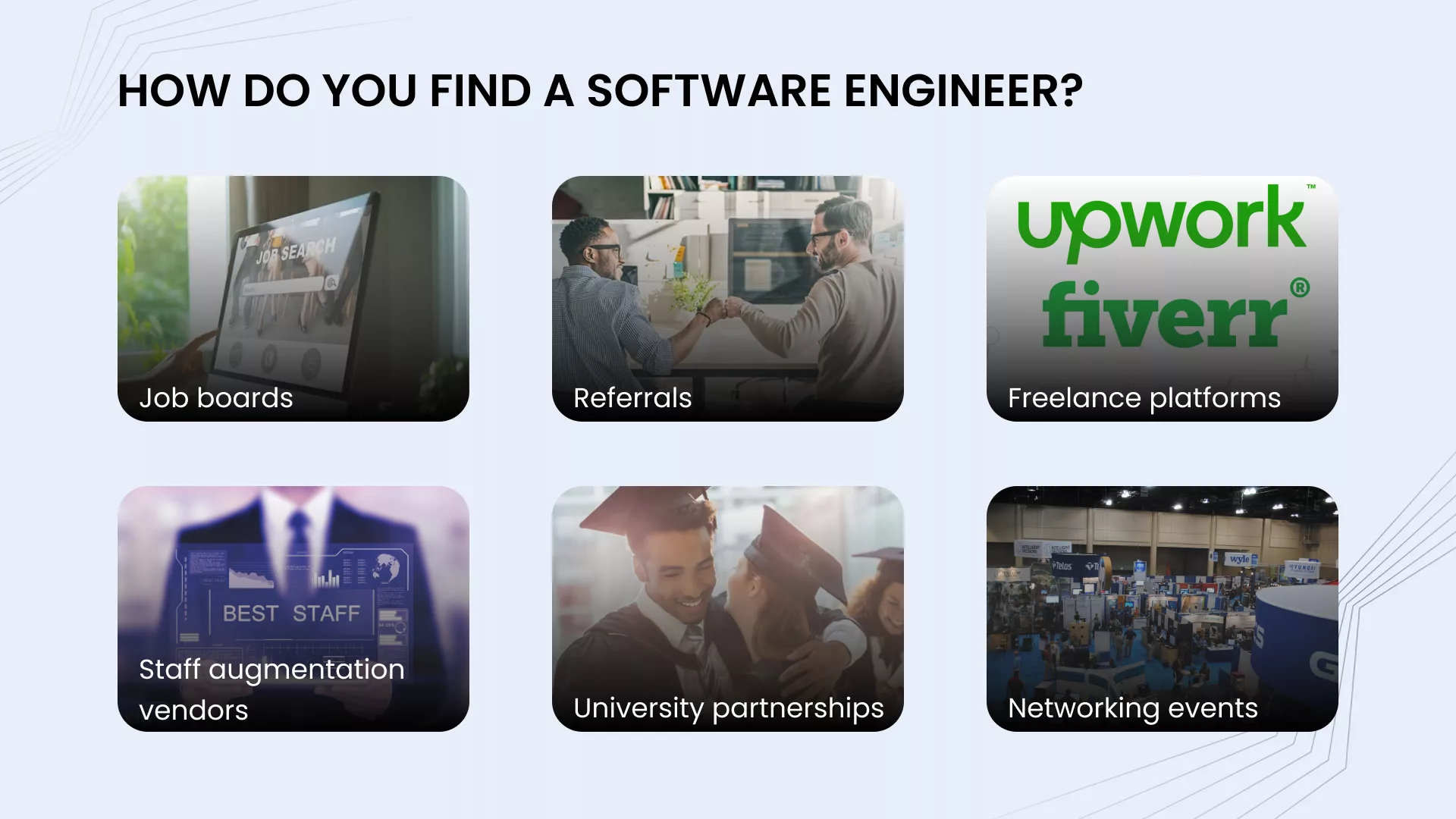
- Try out online job boards. Utilize popular platforms like LinkedIn, Indeed, or niche tech-focused job boards to reach a large pool of candidates.
- Use employee referrals. Leverage your existing network and incentivize employees to recommend qualified individuals from their connections.
- Check out freelance platforms. Explore platforms like Upwork or Toptal for potential freelance developers to fill specific needs or short-term projects.
- Find a reliable staff augmentation vendor. If you want to minimize your participation in searching and hiring software engineers, delegate these tasks to a trustworthy partner.
- Participate in university partnerships. Collaborate with universities or coding boot camps to access recent graduates and early-career talent.
- Visit networking events. Attend industry conferences, meetups, or hackathons to connect with potential candidates and showcase your company culture.
Is it difficult to hire software engineers?
Yes, the current market makes hiring software engineers challenging. Factors like high demand, limited supply, and the need for specific skill sets contribute to the difficulty. However, with a well-defined strategy and a commitment to attracting top talent, you can increase your chances of success.
Can you hire a software developer?
The answer can be both yes and no. You “can” hire a software developer by following the strategies mentioned above. However, the success of finding the “right” software developer depends on several factors, including:
Your budget. Obviously, competitive salaries and benefits are crucial to attract top talent.
Project needs. Clearly define the required skills and experience needed for the specific role.
Hiring process. Implement a well-structured interview process with a good balance of technical and cultural assessments.
Employer brand. Cultivate a strong employer brand that showcases your company culture, work environment, and opportunities for growth.
What is the best way to hire a software developer?
There’s no single “best” way, as the optimal approach depends on your specific needs and resources. However, here are some key strategies for successful hiring:
1. Write an attractive job description. Clearly outline the responsibilities, required skills, and the company culture to attract qualified candidates.
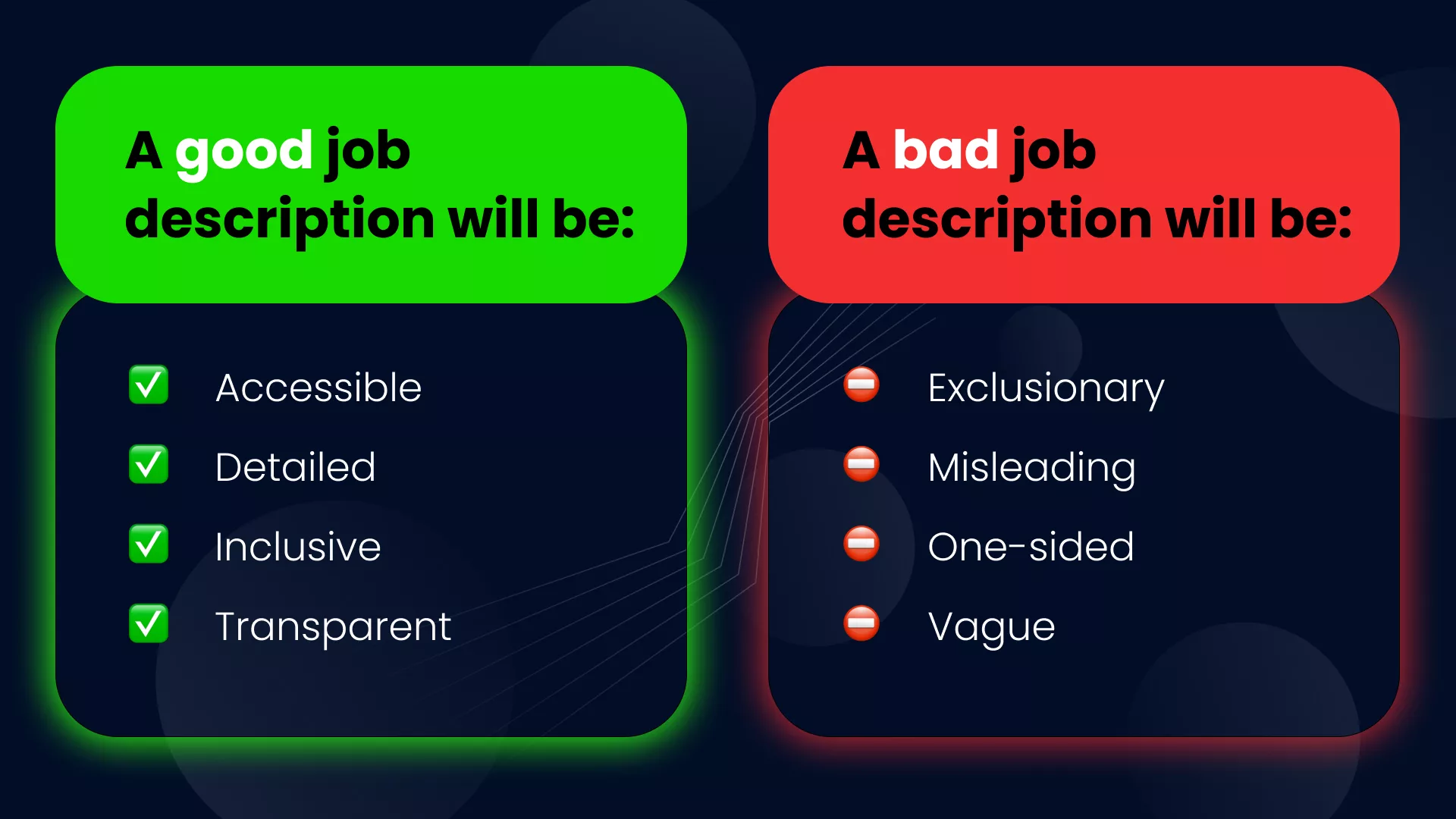
2. Utilize diverse recruitment channels. Advertise on various platforms, leverage your network, and consider alternative options like employee referrals.
3. Develop a well-structured interview process. Include technical assessments, behavioral interviews, and opportunities for the candidate to learn about your company culture and team.
4. Focus on cultural fit and soft skills. Beyond technical expertise, assess the candidate’s teamwork, communication, and problem-solving abilities to ensure they will thrive within your team.
5. Be transparent and timely throughout the process. Communicate clearly with candidates, update them on their application status, and provide feedback.
How much does it cost to hire an engineer?
The cost of hiring a software engineer depends on several factors, including their location, level of expertise, skill set, and your size and industry.
- Salaries and living costs vary greatly between countries and even within different regions of the same country.
- Senior engineers with 5+ years of experience naturally command higher salaries than junior or entry-level employees.
- Engineers with specialized skills in high-demand areas like AI or cybersecurity will typically earn more.
- Larger companies and those in high-paying industries like finance or technology tend to offer higher salaries, while GameDev has lower fees.
Here’s a breakdown of average hourly and annual software engineer salaries in USD for some American and European countries:
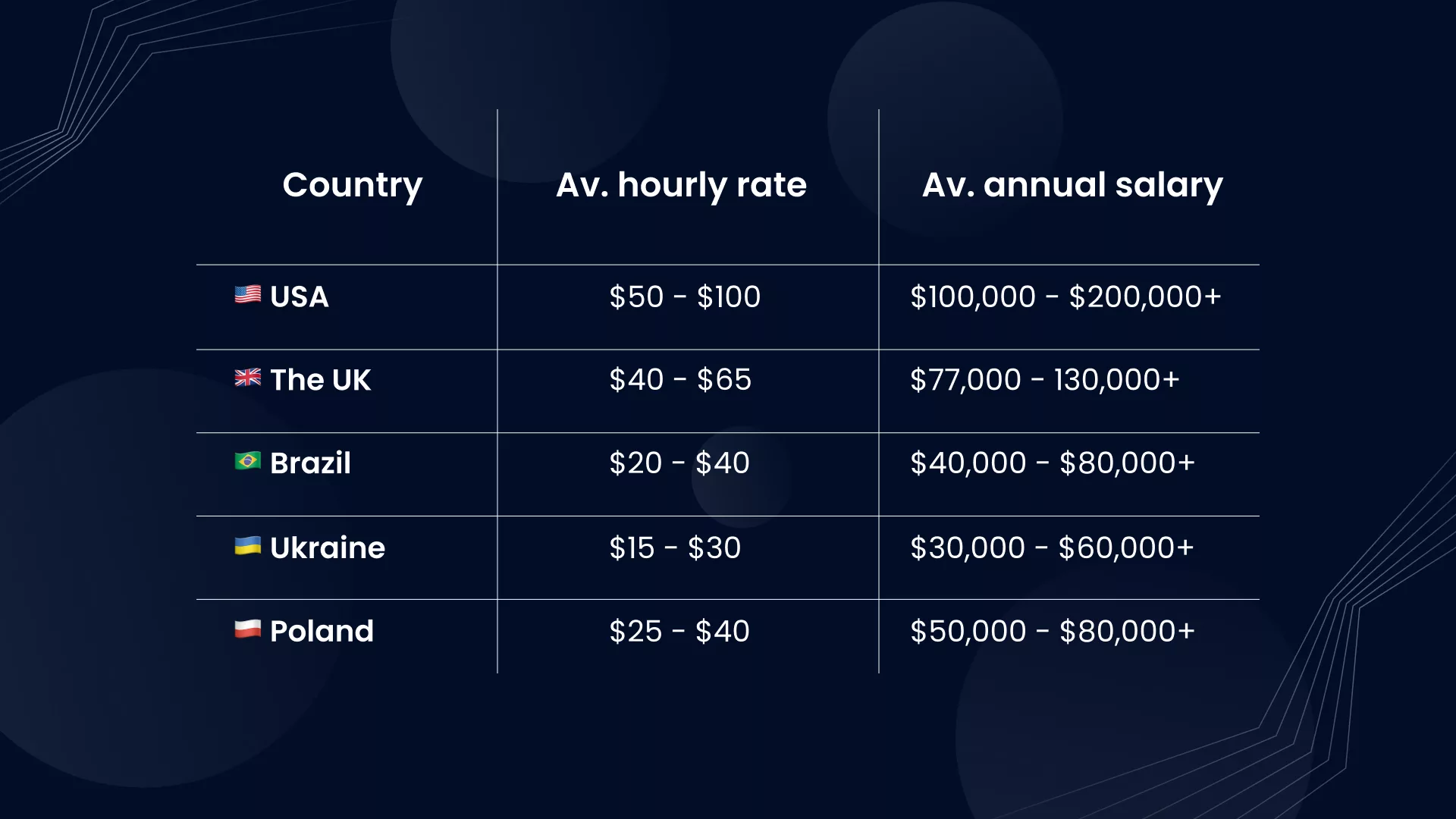
So, how much should you pay your engineer?
There’s no one-size-fits-all answer, but there are three factors to consider. (1) Your budget. Determine how much you are willing to spend on an engineer’s salary and benefits. (2) The market rate. Research the average salaries for similar positions in your region to ensure you’re offering a competitive package. (3) The value the engineer brings. Consider the engineer’s skills, experience, and the impact they will have on your company.
Beyond salary, there are other costs to consider when hiring an engineer, including benefits, recruitment costs, and training expenditures.
- Health insurance, paid time off, and other benefits can add to the overall cost of an employee.
- Recruitment costs can include advertising fees, headhunter fees, and candidate travel expenses.
- Investing in your engineers’ skills can improve their productivity and retention, but it also comes with a cost.
Job market outlook for software engineers in 2024 and above
On the one hand, there are wars and economic and geopolitical instabilities, while on the other – the tech world has never been that developed. What should we expect? What affects the tech talent market in 2024?
High demand for software
- The increasing reliance on technology across various industries continues to fuel the demand for software solutions.
- AI, blockchain, and IoT create new opportunities for software development.
- The ongoing digital transformation of businesses across sectors requires skilled developers to build and maintain critical software systems.
Projected job growth
According to the US Bureau of Labor Statistics, the demand for software developers in the US is expected to grow by 13% from 2022 to 2032, much faster than the average for all occupations.
Skills in demand
While the overall demand remains high, there’s a growing need for software engineers with specific skill sets, including AI and ML, cloud computing, cybersecurity, and full-stack development.
Talking of AI. This technology is undoubtedly influencing the IT labor market, but it’s important to understand its nature. AI is not replacing developers entirely. It can automate repetitive tasks, freeing developers to focus on more complex and creative work. AI creates new skill demands. As AI technologies evolve, developers must adapt and acquire new skills to complement and work alongside AI systems.
Global opportunities
The demand for software engineers is not limited to specific regions. Companies worldwide are looking for skilled developers, offering opportunities for remote work or work in different countries. The “work from anywhere” policy that some companies have incorporated during the pandemic is now a reality.
How to be a software engineer in 2024?
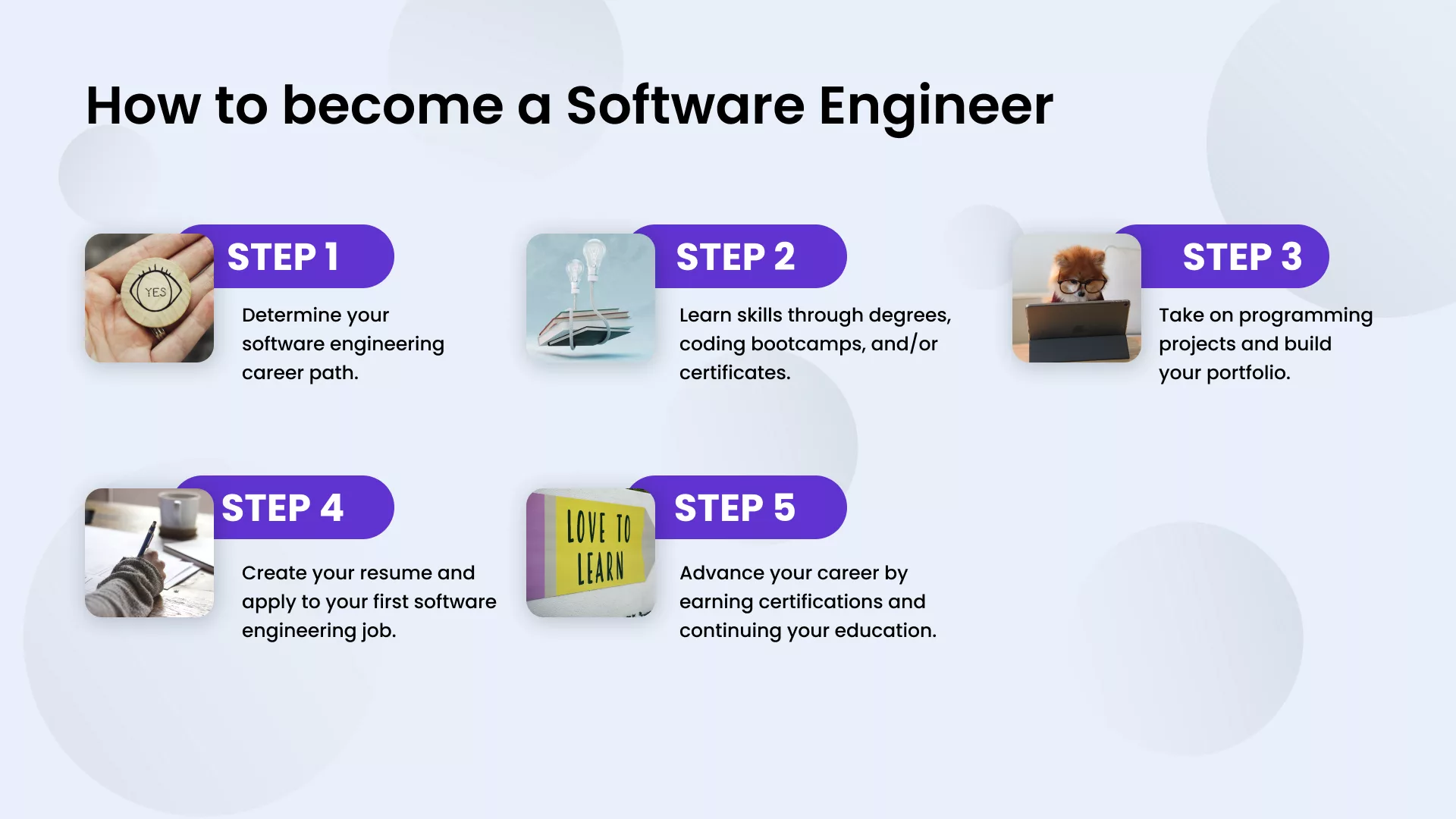
First of all, develop the necessary skills. Pursue education (formal degrees, bootcamps) and self-learning to build your skillset in programming languages, frameworks, and relevant technologies. Even when you finish your education, you will have to stay updated for as long as you’re in the IT sphere, as the tech landscape is constantly evolving.
Building a strong portfolio will help you get your first job offer a lot. Showcase your skills and experience through personal projects, open-source contributions, or freelance work. To get your first job faster, build connections with other developers, attend industry events, and actively engage in the tech community.
Will software engineers be needed in 2030?
With AI developing so fast, can we say that software development and engineering is a profession of the future? Based on current trends and the growing demand for software, it’s highly likely that software engineers will continue to be in high demand in 2030 and beyond. However, the specific skills and expertise needed may evolve as technology advances.
How do you hire the best software engineers?
Here’s a step-by-step guide on hiring an engineer.
1. Define your needs
Clearly outline the responsibilities, required skills, and desired experience for the role in the job description. Establish specific screening criteria to assess candidates’ resumes and cover letters.
2. Attract top talent
Utilize relevant online platforms like LinkedIn or niche tech job boards to reach qualified candidates. Encourage existing employees to recommend talented individuals from their network. Build a strong employer brand by showcasing company culture and employee benefits.
3. Initial screening
Analyze resumes and cover letters to identify candidates who meet the essential qualifications. Utilize automated or manual skill assessments to gauge technical proficiency in relevant areas.
4. Interview stages
Round 1: Phone screen (30-60 minutes)
- Introduction and company overview.
- Review of resume and skills.
- Behavioral questions: Assess cultural fit, communication skills, and problem-solving approach through questions like “Tell me about a time you faced a technical challenge.”
- Technical questions: Evaluate basic technical understanding relevant to the position.
Round 2: Technical interview (60-90 minutes)
- In-depth technical assessment: This may involve coding challenges, live coding exercises, or discussions about specific technical topics related to the role.
- Problem-solving scenarios: Present hypothetical or real-world scenarios and assess the candidate’s problem-solving approach and communication skills.
Check out a great example of a mock technical interview by freeCodeCamp:
Round 3: On-site interview (2-4 hours)
- Meet the team: Interact with potential team members to assess collaborative skills and cultural fit.
- Managerial interview: Discuss broader career goals, salary expectations, and overall fit within the company.
- Technical deep dive: This may involve a more complex coding challenge or whiteboard exercise to assess advanced technical skills.
5. Reference checks and offer negotiation
- Contact references provided by the candidate to verify their work experience and skills.
- Negotiate salary and benefits based on the candidate’s qualifications and market value.
What else can you do?
! Standardize your interview process. Ensure consistency in questioning and evaluation across all candidates.
! Involve relevant team members. Include developers and other team members in the interview process to assess technical skills and cultural fit.
! Provide timely feedback. Keep candidates informed throughout the process and offer constructive feedback even if they are not selected.
DIY: Hiring in-house developers and freelance contractors
When building a software development team with no help from a third-party vendor, you have several options: hiring in-house developers as full-time employees or contracting freelance developers. Let’s figure out which approach is better for you.
| In-house employees | Freelance developers | |
|---|---|---|
| Cost | Salary and benefits. This includes the developer's base salary, bonuses, health insurance, paid time off, and other employer contributions. The average annual salary for software engineers in the US generally ranges from $100,000 to $200,000. Additional costs. Beyond salary and benefits, there are additional costs associated with hiring full-time employees, such as office space, equipment, and training resources. | Hourly rate. Freelance developers typically charge an hourly rate, which can vary depending on their experience, skill set, and location. The average hourly rate for freelance software developers in the US can range from $25 to $100. Project-based rates. Some freelancers may offer fixed rates for specific projects, which can be helpful for budgeting purposes. |
| Pros | - Direct control and management - Stronger team culture and collaboration - Long-term commitment | - Cost-effectiveness - Flexibility - Access to diverse skill sets |
| Cons | - Higher overall cost - Slower hiring process - Less flexibility | - Less control and management - Communication challenges - Project continuity |
Why is it so difficult to hire software engineers?
Why hiring IT specialists is so long, costly, and hard? That’s due to high demand, limited supply, competitive hiring landscape, evolving expectations, and many more. Let’s get you through them.
- The demand for software engineers has outpaced the supply of qualified candidates.
- The increasing reliance on technology across industries and the emergence of new technologies have created a surge in demand.
- Companies often require specific skill sets beyond basic programming knowledge. Expertise in areas like AI, cybersecurity, cloud computing, and specific programming languages is highly sought-after and can be difficult to find in a single candidate.
- With high demand and a limited talent pool, companies compete fiercely to attract the best software engineers. This competition drives up salaries and benefits packages, making it challenging for smaller companies or those with limited resources to compete.
- The rise of remote work opportunities adds another layer of complexity – skilled engineers can now work for companies across the globe, further widening the pool of potential employers and increasing competition.
- Today’s software engineers often have more options and higher expectations from potential employers. They seek companies that offer competitive compensation, a positive work culture, opportunities for growth and development, and a work-life balance.
- Traditional interview methods like technical assessments might not fully capture the skills and potential of a software engineer.
- Evaluating cultural fit, problem-solving abilities, and soft skills can be challenging, further adding to the difficulty of finding the right candidate.
Using coding interview challenges to hire software engineers
Coding interview challenges have become a popular tool for assessing the technical skills of software engineers during the recruitment process. Are they really that good? Certainly, they have some benefits. Coding challenges provide a consistent and objective way to evaluate technical skills compared to traditional interview formats. They assess a candidate’s ability to approach, analyze, and solve problems using code, a crucial skill for software engineers. They can be tailored to specific skills and programming languages needed for the role, allowing an in-depth evaluation of technical proficiency.
What are coding interview limitations? They often focus on specific coding skills and algorithms, potentially neglecting other critical aspects like communication, teamwork, and problem-solving outside of technical coding. The design and selection of coding challenges can unintentionally favor candidates with specific backgrounds or experience in solving similar problems.
What are the best practices for using coding interview challenges?
- Combine them with other evaluation methods. Use coding challenges alongside other tools like behavioral interviews, portfolio reviews, and references to gain a holistic understanding of the candidate.
- Tailor challenges to the role. Design or select challenges that are relevant to the specific skills and technologies required for the position.
- Focus on problem-solving skills. Beyond code syntax, assess the candidate’s approach to analyzing, breaking down, and solving the presented problem.
- Provide clear instructions and expectations. Ensure the challenge is well-defined, instructions are clear, and the candidate understands the evaluation criteria.
- Evaluate beyond the final solution. Consider the thought process, communication, and coding style throughout the challenge, not just the final solution’s correctness.
Ways to delegate software development: What is a software outsourcing company?
A software outsourcing company is a business that provides software development services to clients on a contract basis. This means companies can hire these external teams to work on specific projects instead of building and maintaining their own in-house development teams.
Is software engineering being outsourced? Yes, software engineering is a widely outsourced activity, as is proven by Deloitte, Gartner, and StackOverflow surveys.
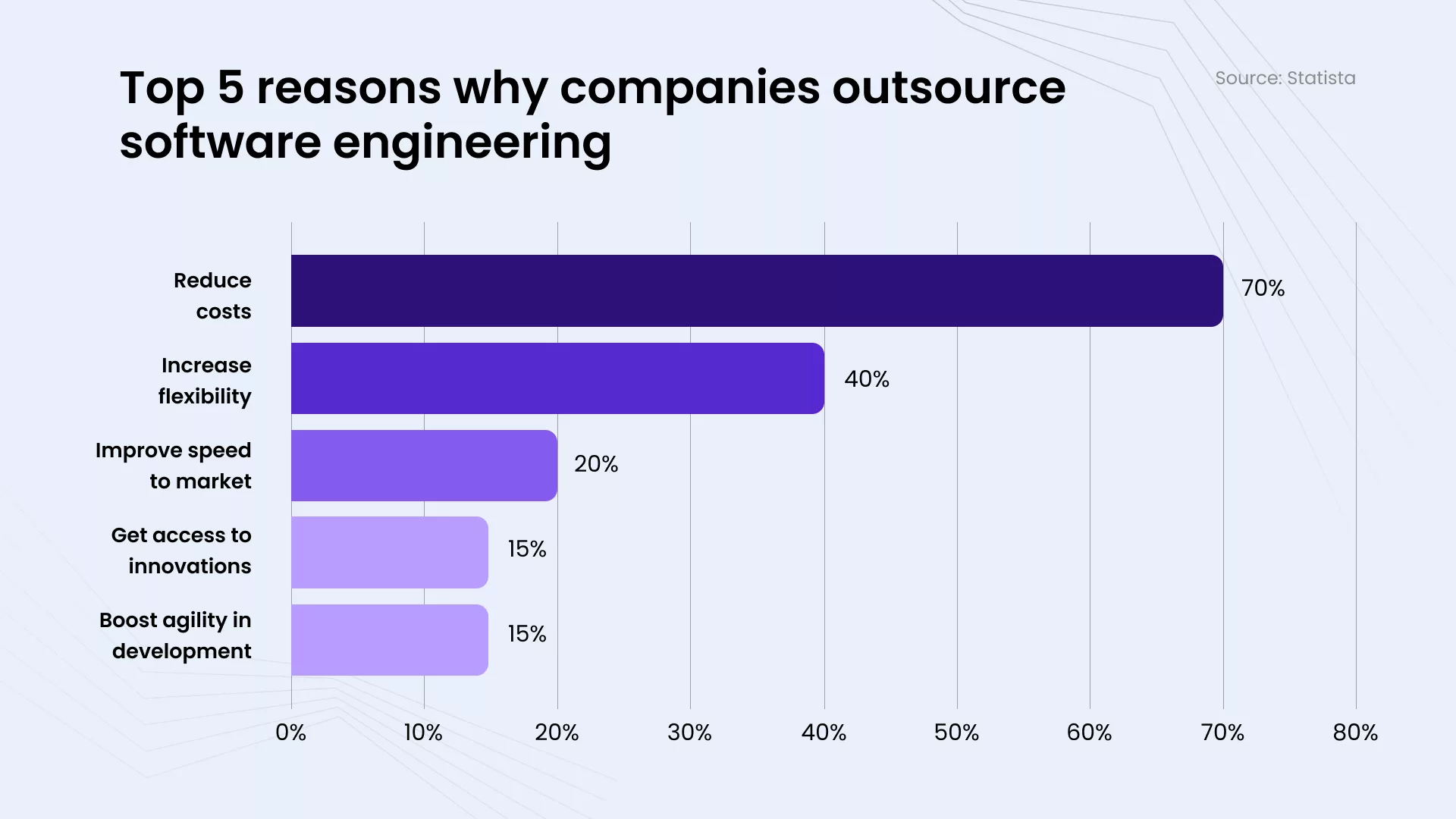
How to choose a software outsourcing company? Consider these factors:
- Expertise and experience. Look for a company with experience in your industry and a proven track record of delivering successful projects.
- Communication and transparency. Ensure clear and consistent communication throughout the project, with established channels and processes for feedback and progress updates.
- Cost and pricing model. Understand the pricing structure, including hourly rates, project-based fees, or other models, and ensure it aligns with your budget and project scope.
- Technology stack and capabilities. Ensure the company has the necessary expertise and resources to work with the specific technologies and tools relevant to your project.
- Cultural fit and collaboration. Choose a company with a work culture compatible with yours, allowing for smooth collaboration and efficient communication.
- Security and data protection. Evaluate the company’s security measures and data privacy practices to ensure the confidentiality and security of your intellectual property.
What’s the difference between software outsourcing and staff augmentation?
While software outsourcing and staff augmentation involve acquiring external resources for software development, they differ in their approach, level of control, and suitability for business needs.
| Software outsourcing | Staff augmentation | |
|---|---|---|
| Approach | Entire project or functionalities | Individual developers or small teams |
| Control | Less direct control | More direct control |
| Management | External team manages the project | Client manages the augmented team |
| Suitability | Well-defined projects | Filling skill gaps, short-term needs, specialized expertise |
What else should you consider before choosing between outsourcing and staff augmentation for your software project?
- Project complexity. For complex projects with intricate requirements, outsourcing might be suitable. For more straightforward projects or specific functionalities, staff augmentation can be sufficient.
- Control and involvement. Staff augmentation is a better fit if you need more control over the development process and prefer close collaboration.
- Existing team and resources. If you have a strong in-house team with specific skill gaps, staff augmentation is your choice.
- Project duration. For short-term projects where you need quick access to specific skills, staff augmentation is a better option.
Content
- 1 Software engineers for hire 2024
- 2 How much does it cost to hire an engineer?
- 3 Job market outlook for software engineers in 2024 and above
- 4 How do you hire the best software engineers?
- 5 DIY: Hiring in-house developers and freelance contractors
- 6 Why is it so difficult to hire software engineers?
- 7 Ways to delegate software development: What is a software outsourcing company?
- 8 What’s the difference between software outsourcing and staff augmentation?



